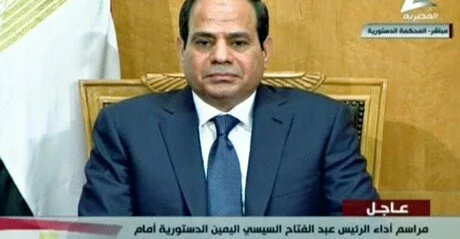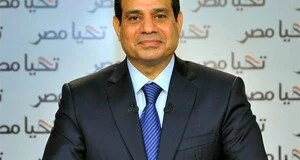 Abdel Fattah al-Sisi took the oath of office as Egypt’s president on Sunday, formalizing his de facto rule since he deposed the elected Islamist president Mohammed Mursi last year and crushed his supporters.
Abdel Fattah al-Sisi took the oath of office as Egypt’s president on Sunday, formalizing his de facto rule since he deposed the elected Islamist president Mohammed Mursi last year and crushed his supporters.
The retired army chief took the oath in a ceremony at the Constitutional Court and broadcast live on television, almost a year since he overthrew Mursi and unleashed a crackdown on his Islamist followers.
Sisi, who overwhelmingly won a presidential election last month despite a low voter turnout, took his oath of office at the heavily guarded Constitutional Court.
“I swear by almighty God to preserve the republican system, and to respect the constitution and the law and to care for the interests of the people; and to preserve the independence of the nation and its territorial integrity,” Sisi declared in the ceremony broadcast live on television.
Palestinian Authority president Mahmoud Abbas, Arab royals from the Gulf and African leaders will later attend a reception at Cairo’s Ittihadiya presidential palace.
Soldiers and police deployed in force in the capital in anticipation of protests by ousted president Mursi’s battered Muslim Brotherhood movement and possible militant attacks.
At the Constitutional Court, elite policemen stood guard as helicopters were used to drop posters of Sisi on dozens of well-wishers who turned up to see the retired field marshal.
“I’m here to congratulate Sisi, the man who rescued us from terrorism and the Muslim Brotherhood,” said one flag-waving supporter, Amira Ahmed.
Sisi won the May 26-28 election with 96.9 percent of the vote, in a crushing defeat for his only rival, leftist leader Hamdeen Sabbahi. However, the voter turnout was 47.5 percent, despite extensions of voting hours and media exhortations for voters to show up at the ballot boxes.
The lopsided victory came nearly a year after Sisi toppled Mursi after millions protested to demand an end to the Islamist’s single year of turbulent rule.
Mursi’s now banned Muslim Brotherhood, whose supporters have been crushed by a massive crackdown, had called for a boycott of the vote.
Sisi’s main challenges will be to restore stability and revive the economy after three years of turmoil, following a 2011 uprising that ousted strongman Hosni Mubarak.
In a televised address after his victory was announced on Tuesday, Sisi called on Egyptians to “work to return security to this nation.”
“The future is a blank page, and it is in our hands to fill with what we want… bread, freedom, human dignity, social justice,” he said.
But Sisi’s opponents fear that under his rule, Egypt will return to an autocratic regime worse than under Mubarak.
Since Mursi’s ouster, the crackdown by the military-installed authorities on his supporters has killed more than 1,400 people and left thousands behind bars.
In the run-up to the election, Sisi said that “national security” takes precedence over democratic freedoms.
He will be the fifth Egyptian president to rise from the ranks of the military, and is expected to reassert the army’s grip on politics.
Saudi Arabia’s King Abdullah, who opposed Mursi’s Brotherhood, called for a donor conference to help Egypt after the results were announced.
The oil kingpin will be represented at the swearing-in ceremony by Crown Prince Salman bin Abdulaziz, alongside the rulers of Kuwait and Bahrain.
Western nations, which congratulated Sisi on his election win while stressing the importance of safeguarding human rights, are sending low-level officials or will be represented by ambassadors.
The United States has voiced concerns about “the restrictive political environment” during the vote, urging Sisi to show “commitment to the protection of the universal rights of all Egyptians.”
Sunday has been declared a national holiday for state employees to allow them to take part in celebrations for the inauguration.
 Islamic Culture & Photo Blog – Muslim Blog Muslim Blog
Islamic Culture & Photo Blog – Muslim Blog Muslim Blog





